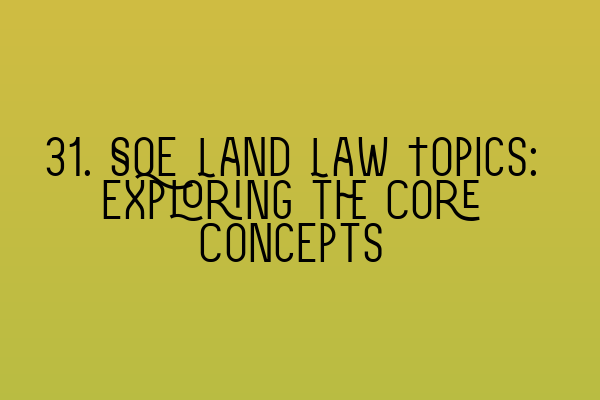31. SQE Land Law Topics: Exploring the Core Concepts
As a solicitor, it is crucial to have a solid understanding of land law. The Solicitors Qualifying Examination (SQE) is designed to test your knowledge in various legal areas, including land law. In this blog post, we will explore the core concepts of land law that you need to master for the SQE.
1. Introduction to Land Law
Land law is a fundamental area of law that governs the ownership, use, and transfer of land. It encompasses a wide range of topics, such as property rights, leases, mortgages, easements, and more. Understanding the basic principles of land law is essential for any aspiring solicitor.
To prepare for the SQE, it is important to familiarize yourself with the key topics covered in land law. These topics will form the foundation of your knowledge and help you navigate more complex legal scenarios in the future.
2. Freehold and Leasehold
One of the fundamental concepts in land law is the distinction between freehold and leasehold estates. A freehold estate grants the owner absolute ownership and possession of land, while a leasehold estate gives a tenant the right to occupy the land for a specified period of time.
Understanding the differences between freehold and leasehold estates is crucial when advising clients on property transactions or disputes. It is also important to be aware of the rights and obligations of both freehold and leasehold owners.
3. Registered and Unregistered Land
In the UK, land can be either registered or unregistered. Registered land is governed by the Land Registration Act 2002 and is held in the Land Registry. Unregistered land, on the other hand, follows the principles set out in the Law of Property Act 1925.
Knowing how to deal with registered and unregistered land is essential as a solicitor. You must be able to conduct land searches, understand land registration procedures, and advise clients accordingly.
4. Co-Ownership
Co-ownership arises when two or more people jointly own a property. There are different forms of co-ownership, such as tenancies in common and joint tenancies.
Understanding the implications of co-ownership is important when advising clients on property disputes or drafting co-ownership agreements. You must be able to explain the rights and obligations of co-owners and find practical solutions to potential conflicts.
5. Easements and Covenants
Easements and covenants are important legal concepts in land law. An easement is a right granted over land, allowing someone to access or use it, such as a right of way. A covenant, on the other hand, is a promise made in relation to the use of land, which binds subsequent owners.
Understanding the nature and enforceability of easements and covenants is crucial when advising clients on property transactions or disputes. You must be able to identify, interpret, and negotiate these legal instruments to protect your clients’ interests.
6. Mortgages
A mortgage is a legal instrument used to secure a loan against a property. It allows the lender to take possession of the property if the borrower fails to repay the loan. Understanding the rights and obligations of both borrowers and lenders in mortgage transactions is essential for any solicitor.
Being well-versed in mortgage law will enable you to effectively advise clients on mortgage agreements, foreclosure procedures, and potential legal issues that may arise during the life of a mortgage.
7. Landlord and Tenant
Landlord and tenant law governs the relationship between landlords and tenants. It covers topics such as tenancy agreements, rent, repairs, eviction, and more.
Understanding the rights and obligations of both landlords and tenants is crucial when dealing with residential or commercial lease transactions. You must be able to draft and negotiate lease agreements, advise on tenant rights, and handle disputes between parties.
Conclusion
Mastering the core concepts of land law is essential for any aspiring solicitor, and it is a key area tested in the SQE. By understanding the topics discussed in this blog post, you will have a solid foundation to build upon as you prepare for the SQE.
To further enhance your preparation, we recommend exploring our related articles:
- SQE 1 Practice Exam Questions
- SQE 1 Practice Mocks FLK1 FLK2
- SQE 2 Preparation Courses
- SQE 1 Preparation Courses
- SRA SQE Exam Dates
At SQE Property Law & Land Law, we provide comprehensive preparation courses to help you succeed in the SQE. Our experienced tutors will guide you through the key topics of land law and equip you with the knowledge and skills necessary to excel in your legal career. Contact us today to learn more about our SQE preparation courses.
